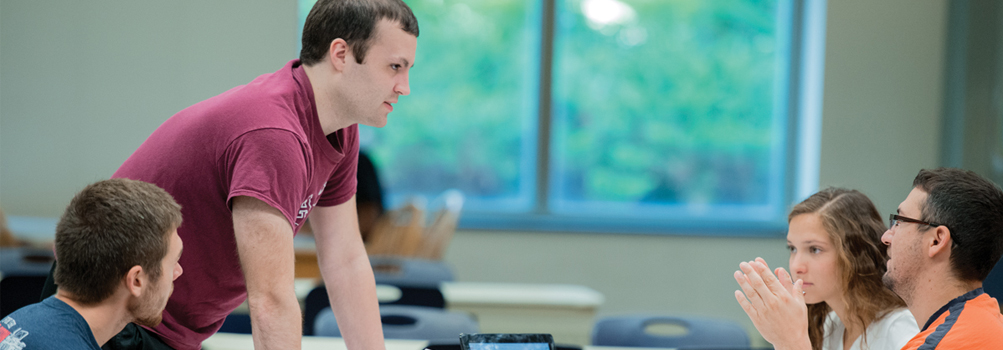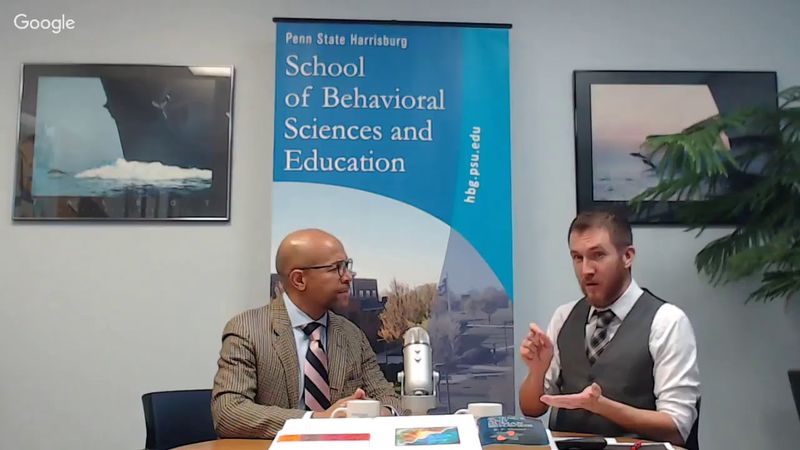The ABAI-accredited Master’s of Arts in Applied Behavior Analysis (ABA) program at Penn State Harrisburg is designed to prepare graduates to develop comprehensive solutions to socially important problems.
Features of our ABA Program
- The Master’s degree program in Applied Behavior Analysis is accredited by the Association for Behavior Analysis International (ABAI) Accreditation Board. This accreditation meets the coursework and degree requirements for BACB® certification eligibility under Pathway 1.
- Includes at least 1,000 hours of Concentrated Supervised Fieldwork. Most students complete the entirety of the BACB fieldwork requirement (1,500 hours) before graduation, saving time and money.
- A master’s project (e.g., empirical research) under faculty guidance and mentoring.
- Flexibility: evening class times are designed to meet the needs of working professionals, as is full- or part-time enrollment.
- Courses are "stacked": most semesters, students can attend three classes in just two evenings on campus.
- Training from nationally-recognized experts in Applied Behavior Analysis.
- Graduates are eligible for Pennsylvania licensure as a Behavior Specialist.
- Opportunities to participate in research, labs, and conferences.
- Be part of a vast network of supportive alumni, peers, and practicing behavior analysts.
What is Applied Behavior Analysis?
Do you ever wonder why people do what they do? After all, many of the problems people face each day are the result of human behavior. Perhaps more importantly, have you ever wondered how to help someone change his or her behavior to live a happier and healthier life?
We in the Applied Behavior Analysis program at Penn State Harrisburg seek answers to these questions, as well as other important questions related to human behavior. Our overriding mission is to improve socially important behavior through applied behavior analysis and to teach our students to do the same.
Our program's course of study is designed to give students the skills of a competent behavior analyst: in-depth understanding of applied behavioral technology, experimental analysis, methodology, and behavioral philosophy.
If you are passionate about applied behavior analysis and want to do your part to make the world a better place, consider applying to the Penn State Harrisburg Applied Behavior Analysis program today.
An In-Person, Face-to-Face ABA Program
Being a behavior analyst is difficult work. There are few subjects more complex, more nuanced than understanding human behavior. We believe an in-person, face-to-face educational format is the best way to prepare you to be an effective and highly competent professional.
A Competitive, Comprehensive Program
- The program admits about 15 students, full-time (9 credits/semester) or part-time (3-6 credits/semester), each academic year. Applying for admissions in the fall semester is recommended, although spring applicants are considered on a case-by-case basis.
- Admissions to the program is competitive, with preference for highly qualified applicants with demonstrated proficiency in academic (e.g., undergraduate) and clinical (e.g., related work experience) settings.
- Full-time students typically complete the program in about two years, perhaps with an additional semester to complete the master project. The length of the program for part-time students depends on the individual program of study.
Your ABA Degree After Graduation
A 2018 report published by the Behavior Analysis Certification Board shows that demand for behavior analysts has increased by approximately 800 percent from 2010 to 2017 in almost every state. Graduates of the Penn State Harrisburg ABA program serve a wide range of individuals across a multitude of settings around the world. Many of our graduates take positions as behavior analysts serving individuals with Autism Spectrum Disorder. Some of our graduates forge new paths and avenues for behavior analysis (e.g., training teachers and school support staff in behavioral interventions). Graduates of the program have completed doctoral training, started service provider companies, act as program directors, engage in advocacy and legislative change, and most importantly, serve as behavior analysts providing support for individuals in need.
Certification and Licensure
- Graduates of the program meet the coursework and degree requirements for eligibility to sit for the BCBA® examination under Pathway 1, as outlined by the Behavior Analyst Certification Board (BACB).
- Many US states and territories require professional licensure/certification to be employed. If you plan to pursue employment in a licensed profession after completing this program, please visit the Professional Licensure/Certification Disclosures by State interactive map.





